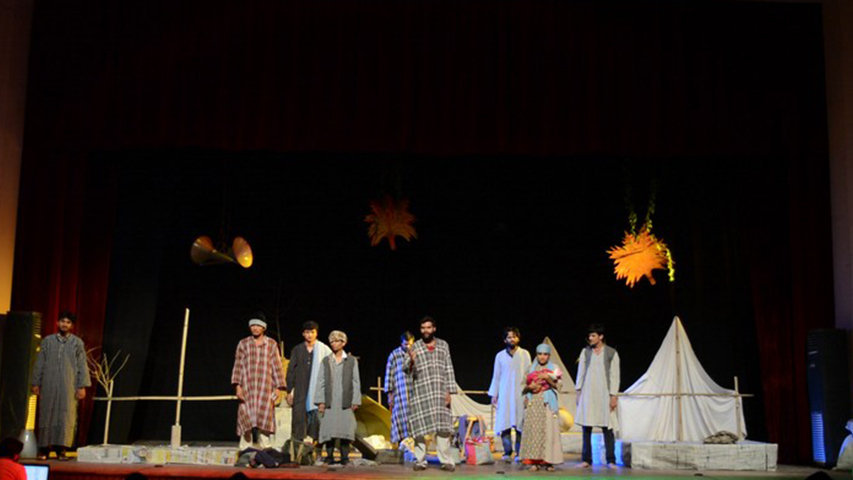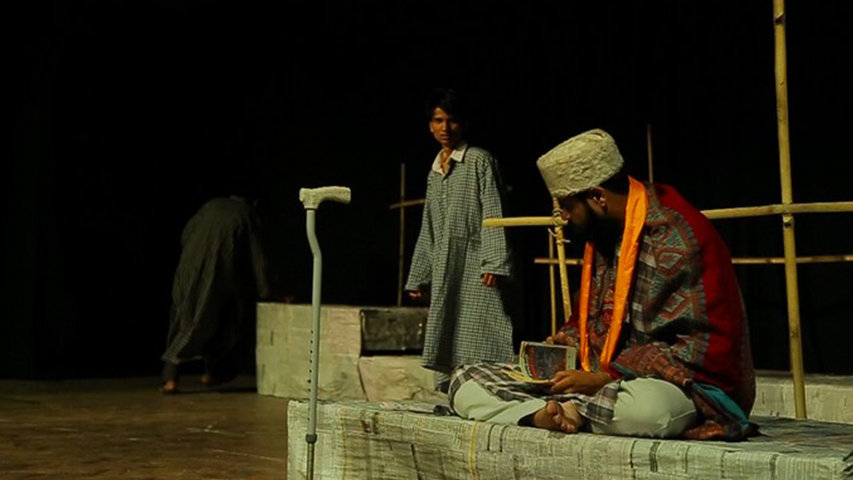There has been very little work across media on the tragedy of Kashmiri Pandits, who were turned into refugees in their own country. A Jodhpur-based theatre group, Abhinay Gurukul, staged a play titled Lost Paradise as part of the Theatre Olympics in India.
Aru and Swati Vyas’s production gives audiences a stark reminder of the suffering of Kashmiri Pandits, who have been forgotten, as images that come out of Kashmir in the media are of unrest, violence, stone-pelting, the army on the streets. Thousands of Kashmiri Pandits were slaughtered by militants, others compelled to leave the valley after constant threats, their homes and businesses destroyed. The horror of mulilated bodies strung up on trees, vicious slogans played all day on loudspeakers, the men threatened with death, the women with rape—the Pandits had no choice but to leave and throw themselves at the mercy of the government.

Source :8th Theatre Olympics 2018 in India - National School of Drama-
When the audience enters the theatre, tattered clothes, shoes and other debris are strewn around; inside the auditorium, actors lie still as corpses in the aisles, and audiences have to carefully skirt around them to get to their seats. If the idea was to disturb or intrigue, the group succeeded.
The young actors then proceeded to enact the horrific period of the rise of militancy and the forced exodus the Pandits in the 1990s. The older generation is shocked at the betrayal by their neighbours and friends of many years—one man is shot dead by his best friend, another simply keels over and dies rather than leave his home.
After they are evicted, they are dumped into crowded refugee camps, with no facilities. They have to beg for food, water and medical help; and pay bribes to get basic amenities. They are treated with appalling cruelty and when they protest are told, “Why did you leave Kashmir?”

Source :8th Theatre Olympics 2018 in India - National School of Drama-
Lost Paradise is a play within a play—a young theatre group is preparing a play about Kashmir to participate in a festival. The actors have no clue about what happened there, and when they enact the horrors they are distressed by it. They tell the director they can’t carry on, it is too much for them to take. The director want to do something meaningful and keeps exhorting them to do their best. The actual process of putting together Lost Paradise was also similar—the actors improvised the scenes and lines after reading and watching videos about Kashmir; they were also troubled by what they discovered and then had to perform.
Aru and Swati Vyas, deliberately used the alienation technique of snapping the actors and the audience out of the intensity of the play and smoothly returning to it; in Brechtian style, the audience is drawn into the play and also kept aware that they are watching actors perform. Still, the realism of the play—the costumes, music, lighting, simple but effective set design, and heartfelt performance—is gripping and heart-rending. If some bits seem melodramatic, one just has to remember that people actually went through the experiences that the play is depicting. The Pandits never got justice from the system, at least art can help get their message across, even if it is over two decades later.





-173X130.jpg)

-173X130.jpg)
-173X130.jpg)

-173X130.jpg)
-173X130.jpg)
-173X130.jpg)